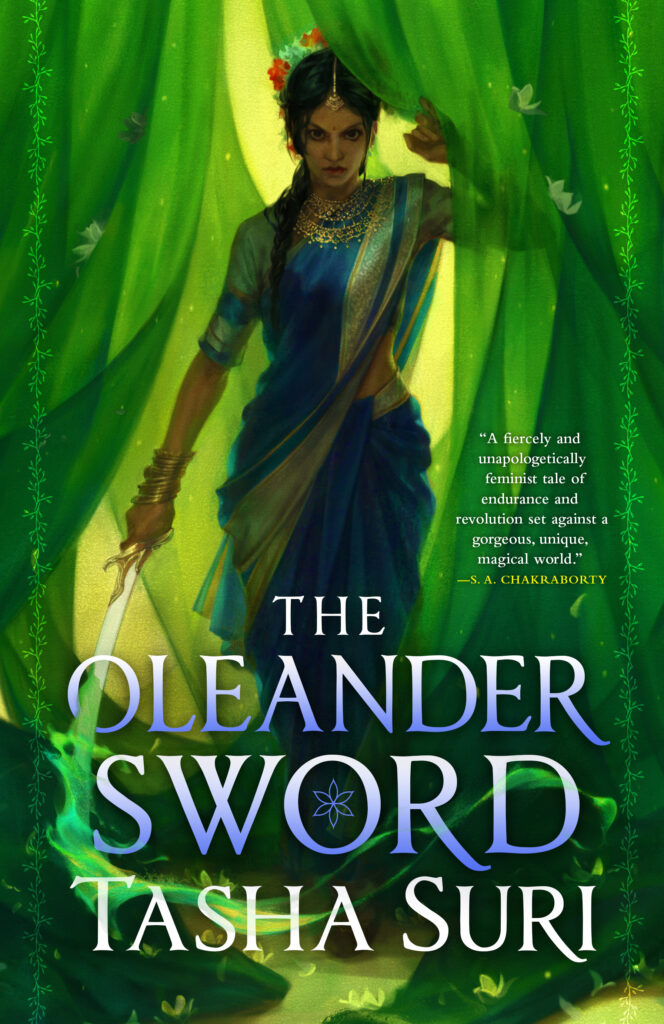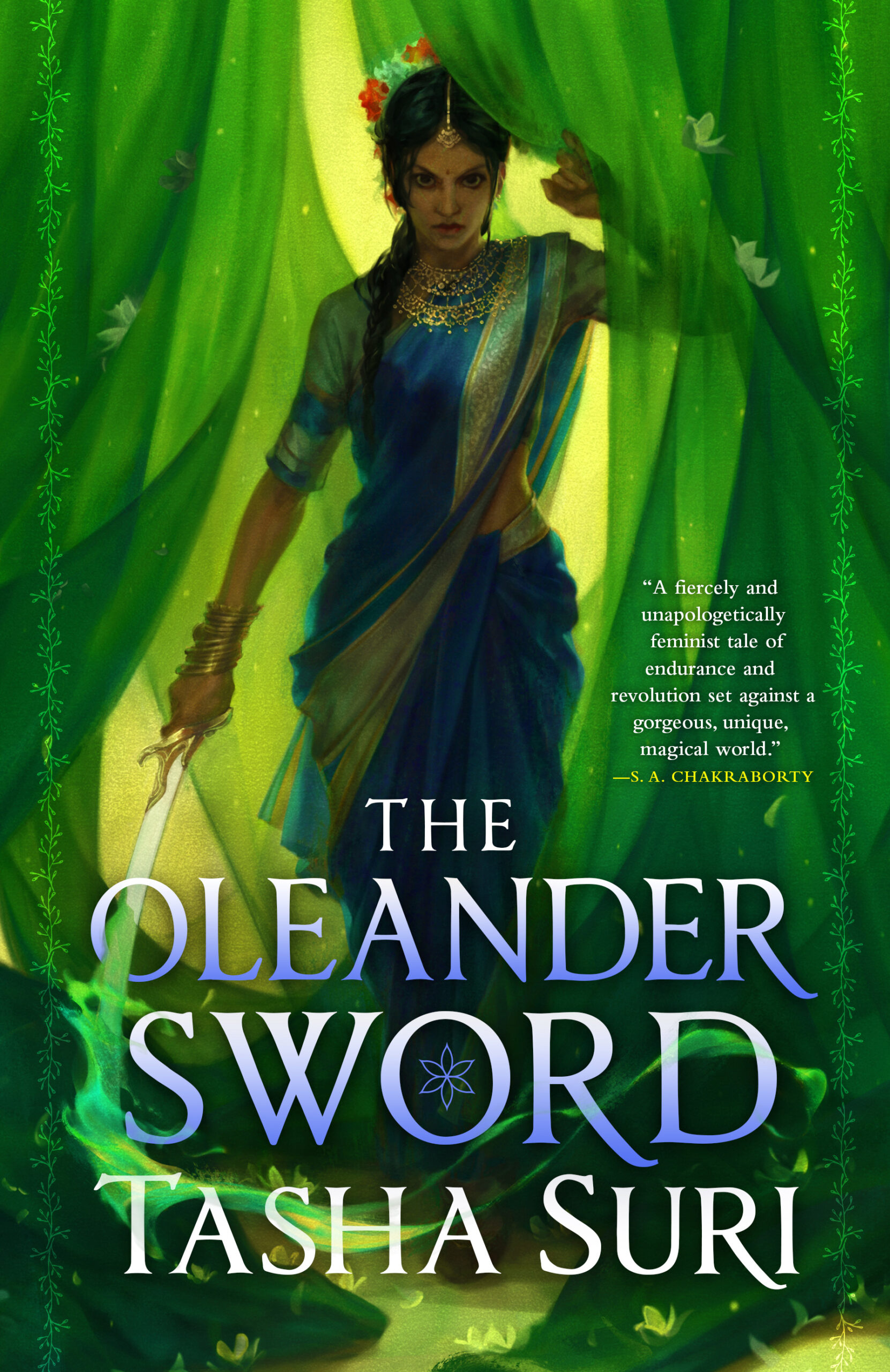
Genres: Fantasy, Epic Fantasy, Secondary World Fantasy, Queer Protagonists
Representation: Desi-coded setting and cast, F/F
PoV: Third-person, past-tense; multiple PoVs
Published on: 16th August 2022
ISBN: B09N5S3FFC
Goodreads

The prophecy of the nameless god—the words that declared Malini the rightful empress of Parijatdvipa—has proven a blessing and curse. She is determined to claim the throne that fate offered her. But even with the strength of the rage in her heart and the army of loyal men by her side, deposing her brother is going to be a brutal and bloody fight.
The power of the deathless waters flows through Priya’s blood. Thrice born priestess, Elder of Ahiranya, Priya’s dream is to see her country rid of the rot that plagues it: both Parijatdvipa's poisonous rule, and the blooming sickness that is slowly spreading through all living things. But she doesn’t yet understand the truth of the magic she carries.
Their chosen paths once pulled them apart. But Malini and Priya's souls remain as entwined as their destinies. And they soon realize that coming together is the only way to save their kingdom from those who would rather see it burn—even if it will cost them.
I received this book for free from the publisher via NetGalley in exchange for an honest review. This does not affect my opinion of the book or the content of my review.
Highlights
~turn the masks they make you wear into weapons
~much delicious yearning
~(un)holy fire
~careful who you promise your heart to
~watch the queen conquer
I really, really, really enjoyed Jasmine Throne.
But I am here to tell you that I love The Oleander Sword.
The second book in the Burning Kingdoms trilogy wraps around you like a silken sari, somehow even more sumptuous than its predecessor. You can smell the flowers and feel the fire, bespelled by Suri’s exquisite, sensual prose; page by page, Oleander Sword sinks its roots into your heart and doesn’t let go.
Of course, why would you want it to?
Oleander opens a year after the end of Jasmine, with Priya a temple elder dedicated to curing the rot, and Malini waging war to claim her throne as Empress of Parijatdvipa. When the Emperor’s forces reveal a new and terrible weapon, Malini decides she needs one of her own…and asks for Priya’s aid. But ancient powers are waking in Ahiranya, and another, much more devastating war may be on the horizon.
I love how much this series is an ode to and celebration of unlikable women; how these books explore so many different facets of femininity; how they showcase the experience of women in a world built by and for men. When I reviewed Jasmine Throne, I talked a little bit about how well the Ahiranyan plant-magic worked as a metaphor for female strength, and I still think that’s true. The difference is that in Oleander Sword, both Priya and Malini get to be strong – and powerful, which isn’t always the same thing – in the open. In that way it’s more wish-fulfilling, more intoxicating, than Jasmine was; we get to glory and luxuriate in the both of them being different kinds of power-fantasy!
Which is not to say, alas, that life has become easy for either of them: Malini, in particular, is constrained by the expectations – expectations which are very nearly demands – of the men who serve her; she must embody the ideal of womanhood, especially royal womanhood, wherever anyone might see, in order to hold on to their loyalty. But while she was seriously ill and then in recovery in Jasmine Throne, here we see her at her best – and her best is glorious. Empress Malini more than lives up to the potential and promise of her princess past-self: given free rein (and reign) at last, she’s on full display in this book as a master manipulator, the sun at the heart of the political solar system, with generals and princes kneeling at her feet. All while still being her brilliantly vicious, ruthless, vengeful self behind the lovely mask.
Malini is the eponymous Oleander Sword; a blade of flowers, deceptively feminine, but the beauty of it – the oleander blossom – is, itself, a deadly poison. Femininity – the ideal of womanhood – wielded as a weapon, not just against her enemies but also, really, against the men under her banner; men manipulated and controlled by the ideal they hold her to. What’s meant to be Malini’s cage, her constraints, she turns back against the world and uses, and I love her for it.
Priya is very different – she doesn’t have to be pure and dutiful and a Good Woman, because she’s a monster, and her savage joy in that fact is wonderful. In a lot of ways, actually, she and Malini are perfect opposites; Malini is a monster pretending not to be, and Priya wears her monstrousness in the open…and is maybe a lot more ‘good’, as we’d recognise it, than Malini, underneath it all. It’s hard not to adore how well they fit together, and especially the way in which Priya embraces all of Malini, cruelty and mercilessness and all.
I didn’t find their relationship in Jasmine Throne to be a big sweeping romance – and I liked that a lot! – but Oleander Sword very much makes up for it. Despite being surrounded by eyes that can not be allowed to see them together, Priya and Malini become beautifully entwined in this book; and what I loved most about it is that it is so…so unrepentant. There are absolutely soft moments between them, and tenderness, but they both know who the other is, and have no interest in changing each other. Malini is not going to become a good person because she loves Priya. Priya is not going to become a tame thing because she loves Malini. And neither of them want that. Which makes their love story feel very unconventional and unique, and gives their passion a feral, dangerous edge; the two of them together are terribly beautiful and beautifully terrible, and it’s perfect.
You are like ink, Malini thought helplessly. Ink, and all I want is to make poetry of you.
Oleander Sword introduces a new POV character that I wasn’t expecting and probably should have been: Chandra, Malini’s fucked-up, religious-fanatic brother, sitting Emperor of Parijatdvipa. All I can say is that Suri absolutely nailed the complicated, horrific tangle of religious devotion and narcissism and racism that is this abominable man. Suri makes him feel human and all-too-real without giving him excuses or making him sympathetic; he’s a complex character, but an unforgivable one, which is exactly the way I’d have wanted him treated if it were up to me.
his unyielding desire for a better world, for better people.
The above quote is one I turned over and over in my mind while I was reading this book, because it sums Chandra up so well. At first glance, the desire for a better world is something most of us would approve of, but…it’s unyielding desire. And ‘better people’? The idea of an unyielding desire for better people gave me flat-out chills.
Suri’s writing in this book, her prose, is just like that; her words stay with you, individual sentences getting caught in your thoughts. She’s been a master storyteller since she came out of the gate with Empire of Sand in 2018, but I swear Oleander Sword is on a whole other level even than Jasmine Throne; even lusher, more poetic, jewel-toned, sharp as the titular sword. Suri builds sentences like constellations, every word a star in exactly the right place to dazzle you and imprint its story on your heart.
It was a voice made for mantras, for song, for guidance. For pouring faith, like wine, into the cup of a waiting heart.
That was how priests often asked questions, Kartik had learned. Questions mildly phrased that demanded answers clawed from the marrow of a man’s bones, the deepest blood of his heart.
At least she had found the kind of love that would break the world for her sake, and make it into something that would always wear her mark.
And what a story! I haven’t actually talked much about the plot, because it’s difficult to go into without entering spoiler-territory, but Oleander Sword gives the impression of having so much more space for the story – and characters – to breathe. This book is about Malini claiming her throne, and that means war; it means tactics, battles, shifting alliances, politics, princes and generals to make dance to Malini’s tune. But it also delves deep into religion, into the ancient past of Parijatdvipa and Ahiranya, into the different sects of the Mothers and the various currents of belief and loyalty running through the priesthood. Into the relationship between Parijatdvipa and Ahiranya; what it was in the past, what it is now, what it might be in the future. Suri has spun us a sequel-saga of intrigue and action, faith and love, battles that take place in the world, the heart, and the mysterious sangam of the yaksa – and no one else could possibly do it justice.
The Oleander Sword is soft as petals and piercing as thorns, and the story itself comes together like an offering-garland at the feet of the Mothers, a dozen different blossoms woven together by an impossibly deft hand. Even if, by some un-miracle, you didn’t love Jasmine Throne, you should still pick up Oleander Sword.
It’s simply a masterpiece.







AAAAAAAAAH
I’m not reading your review until I’ve read the book, but just your review title has me screaming with anticipation :D
I’ve been not-reading this ARC in favour of some other ARCs and WHYYYYYY when I am also longing for the comfort of a familiar world / characters I’m already attached to? Because I’m an idiot with an overheated brain, clearly. So thank you, I needed to pick my next book today and now I am all sorted :D
You are welcome, and I’m VERY sure you’re going to love it!!!